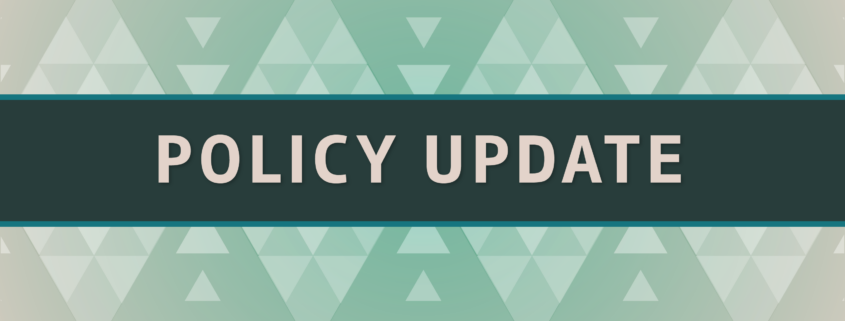DOJ and DOI Responses to the Not Invisible Act Commission’s Recommendations Includes MMIP Resources for Urban Indian Communities
On March 5, 2024, the Department of Justice (DOJ) and the Department of Interior (DOI) (“the agencies”) released their response to the Not Invisible Act Commission’s (“Commission”) findings and recommendations on how to combat the missing or murdered Indigenous people (MMIP) and human trafficking (HT) crisis. The Commission’s findings and recommendations and the responses by the DOJ and DOI mention urban Indian organizations (UIOs) and urban American Indian and Alaska Native people and communities. Importantly, the agencies state that UIOs are eligible for funding under Office on Violence Against Women (OVW) programs.
Key Responses by the Agencies
UIOs are referenced in sections pertaining to law enforcement and investigative resources, coordinating resources, victim and family resources and services, and Alaska-specific issues. The following are key responses by the agencies to the Commission’s findings and recommendations.
Law Enforcement and Investigative Resources
In response to the Commission’s recommendation of the DOJ Office of Victims of Crime (OVC) and the Department of Health and Human Services (HHS) Office on Trafficking Persons (OTIP), the agencies stated that the Office of Justice Programs (OJP)/OVC’s Project Beacon: Increasing Access to Services for Urban American Indian and Alaska Native Victims of Human Trafficking, “currently funds five urban Indian centers that are working to increase their capacity to provide comprehensive services to Native victims through strategic collaborative partnerships with both Tribal and non-Tribal organizations and agencies.” The agencies also said that the DOJ “will work with other agencies as appropriate to further explore the recommendation regarding tracking and aggregating racially biased policing in and around Indian Country, of Indians in urban areas, and in Alaska”, which was a specific recommendation of the Commission.
Coordinating Resources
The Commission recommended that either the OVW or the OVC provide technical assistance to small-staff advocacy organizations by employing “user-friendly, virtual tutorials” to “enhance the [grant funding] application experience and…accommodate the diverse circumstances in Tribal and urban Indian communities (including communities lacking access to broadband.”
As part of their response, the agencies stated “DOJ’s OVW offers live and recorded pre-application webinars to go over application requirements in detail and answer questions about the application process.”
Victim and Family Resources and Services
The Commission found that “[t]here has been a historical lack of services for [American Indian and Alaska Native] victims and families of MMIP and HT that are Native-led, culturally specific, and trauma-informed” and that “[u]rban areas bear the burden of providing culturally-relevant resources to an extremely diverse population: 70 % of [American Indian and Alaska Native] people live in urban areas. Further, the system actors with whom urban Indian organizations interact are less likely to have any training or competence in providing culturally relevant services” which “exacerbates the trauma experienced within [American Indian and Alaska Native] communities.” The Commission recommended that “[s]ervices…be provided through an integrated care model utilizing a public health and safety approach, and include Native-led, culturally specific practices and care. Baseline funding to implement, strengthen, and seek TTA to provide continuum of care models for survivors and families of MMIP and HT, such as, First Nations Mental Wellness Continuum Framework, must be provided to [American Indian and Alaska Native] Tribal nations, Indigenous-led Community Based Organizations (CBO) and urban Indigenous organizations.”
The agencies responded by saying that the Bureau of Indian Affair’s (BIA) Tiwahe Program framework “is an Indigenous approach to thinking about well-being within a system, with the well-being of individuals, communities, Tribes, and the natural environment working in an interlinked and interdependent ways.” UIOs are one type of entity that can use this framework. Additionally, the OVC’s Tribal Victim Services Set-Aside Formula Grant Program (TVSSA) and other OJP/OVC funding opportunities provide “funding to support comprehensive, culturally appropriate, trauma-informed, victim-sensitive services” to both urban and Tribal community located American Indian and Alaska Native crime victims. Lastly, UIOs themselves are eligible for funding through OVW grant programs, including those supporting culturally specific services for survivors of domestic violence, dating violence, sexual assault, and stalking.
Alaska-Specific Issues
The Commission recommended that “[t]he MMIP Regional Outreach Program through the [Executive Office of the United States (U.S.) Attorneys (EOUSA)] must be expanded to include more than one coordinator and [Assistant U.S. Attorney (AUSA)] to serve Alaska.”
As part of their response, the agencies stated “[a]s program regions are fully staffed, the regional AUSAs and coordinators will begin regional outreach to federal, Tribal, state, and local law enforcement; victim- and MMIP-related governmental and nongovernmental organizations; and urban Indian organizations to provide information about the program’s resources, roles, and services provided and develop a regional resource list.”
Background on the Commission
The National Council of Urban Indian Health (NCUIH) along with other national Native organizations worked in support of the Not Invisible Act legislation, which was enacted in October 2020. The Act required the Secretary of the Interior, in coordination with the Attorney General to establish and appoint a joint commission on violent crime against American Indian and Alaska Native people. Secretary of the Interior Haaland was the lead sponsor of the Not Invisible Act when she served in Congress. The bill was passed unanimously by voice vote in both chambers of Congress.
Commissioner Sonya Tetnowski is a citizen of the Makah Tribe and CEO of the Indian Health Center of Santa Clara Valley. She currently serves as the President California Consortium of Urban Indian Health (CCUIH) and previously served as NCUIH’s Board President. Ms. Tetnowski works daily in support of the health and wellness services to American Indians and Alaska Natives living in urban areas. Violence against American Indians and Alaska Natives is a public health crisis and is considered a social determinant of health (SDOH). NCUIH is committed to the reduction of violence impacting Native communities.





